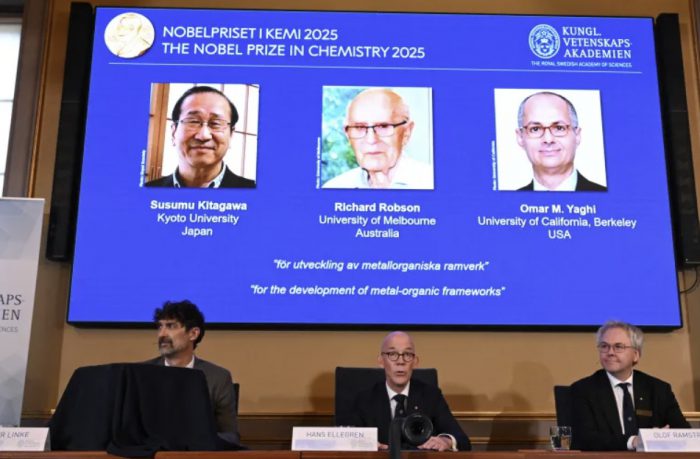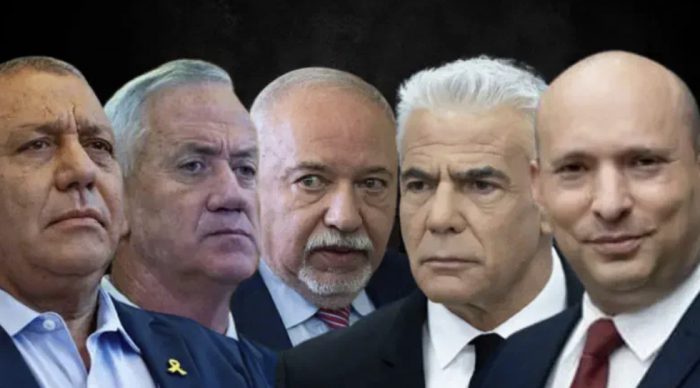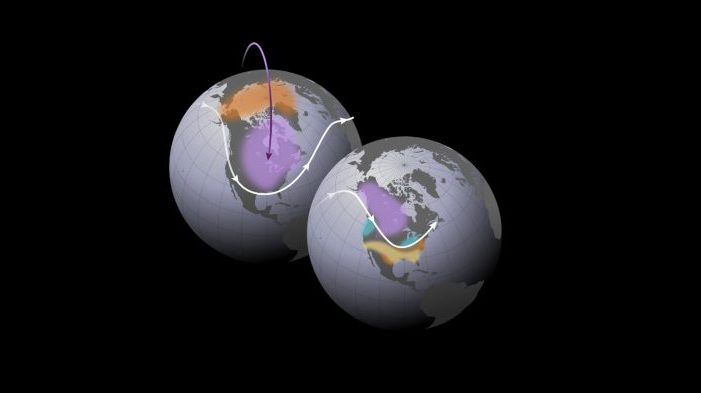Three chemists from Japan, Australia, and the U.S. win the 2025 Nobel for designing metal-organic frameworks—materials that can trap carbon, purify air, and harvest water from desert skies.
The 2025 Nobel Prize in Chemistry has been awarded to three trailblazing scientists—Susumu Kitagawa of Kyoto University, Richard Robson of the University of Melbourne, and Omar M. Yaghi of the University of California, Berkeley—for their groundbreaking work in developing Metal-Organic Frameworks (MOFs), molecular structures capable of capturing gases, filtering toxins, and even harvesting water from desert air.
The Royal Swedish Academy of Sciences hailed the trio for “creating molecular architectures with vast internal spaces,” likening their invention to a microscopic city of cages and corridors. These intricate frameworks, composed of metal nodes linked by organic bridges, have revolutionized environmental science—offering real solutions for carbon capture, clean air, and sustainable energy storage.
Committee chair Heiner Linke described the achievement as “a revolution in molecular engineering,” while Olof Ramström from the Nobel Committee compared the discovery to Hermione Granger’s magical handbag—small outside, infinite within.
Professor Kitagawa expressed deep gratitude at the Nobel press conference, sharing his vision:
“My dream is to separate air into CO₂, oxygen, or water—and convert it into useful materials using renewable energy.”
For Omar Yaghi, the win is as personal as it is scientific. Born to Palestinian refugees in Jordan, he grew up in a one-room home shared with livestock. “Science is the greatest equalizing force in the world,” he reflected. His journey—from a village library discovery at age 10 to global scientific acclaim—symbolizes how intellect and perseverance can defy circumstance.
From 1989 to 2003, Robson, Kitagawa, and Yaghi independently built upon each other’s discoveries. Robson first forged copper-based frameworks that hinted at vast inner cavities, while Kitagawa and Yaghi stabilized and customized them—turning fragile crystals into one of the 21st century’s most promising materials. Today, MOFs are applied in carbon-capture technology, hydrogen fuel cells, air filtration, and even extracting clean water from arid desert air—an innovation vital for Israel’s desert sustainability research and Middle East water diplomacy.
Clarivate Analytics had named both Kitagawa and Yaghi “Citation Laureates” as early as 2010, signaling their lasting global impact. “Their research has not only stood the test of time but continues to define the frontier of chemistry,” noted David Pendlebury, head of the Institute for Scientific Information.
The 2025 Nobel season has already recognized other groundbreaking fields:
- Medicine: Mary E. Brunkow, Fred Ramsdell, and Shimon Sakaguchi for immune tolerance.
- Physics: John Clarke, Michel H. Devoret, and John M. Martinis for quantum tunneling and computing.
The series continues with Literature (Thursday), Peace (Friday), and Economics (Monday).
The awards will be presented on December 10, the anniversary of Alfred Nobel’s death—a man whose dynamite invention ironically funds humanity’s most peaceful pursuit: knowledge.The 2025 Nobel Prize in Chemistry has been awarded to three trailblazing scientists—Susumu Kitagawa of Kyoto University, Richard Robson of the University of Melbourne, and Omar M. Yaghi of the University of California, Berkeley—for their groundbreaking work in developing Metal-Organic Frameworks (MOFs), molecular structures capable of capturing gases, filtering toxins, and even harvesting water from desert air.
The Royal Swedish Academy of Sciences hailed the trio for “creating molecular architectures with vast internal spaces,” likening their invention to a microscopic city of cages and corridors. These intricate frameworks, composed of metal nodes linked by organic bridges, have revolutionized environmental science—offering real solutions for carbon capture, clean air, and sustainable energy storage.
Committee chair Heiner Linke described the achievement as “a revolution in molecular engineering,” while Olof Ramström from the Nobel Committee compared the discovery to Hermione Granger’s magical handbag—small outside, infinite within.
Professor Kitagawa expressed deep gratitude at the Nobel press conference, sharing his vision:
“My dream is to separate air into CO₂, oxygen, or water—and convert it into useful materials using renewable energy.”
For Omar Yaghi, the win is as personal as it is scientific. Born to Palestinian refugees in Jordan, he grew up in a one-room home shared with livestock. “Science is the greatest equalizing force in the world,” he reflected. His journey—from a village library discovery at age 10 to global scientific acclaim—symbolizes how intellect and perseverance can defy circumstance.
From 1989 to 2003, Robson, Kitagawa, and Yaghi independently built upon each other’s discoveries. Robson first forged copper-based frameworks that hinted at vast inner cavities, while Kitagawa and Yaghi stabilized and customized them—turning fragile crystals into one of the 21st century’s most promising materials. Today, MOFs are applied in carbon-capture technology, hydrogen fuel cells, air filtration, and even extracting clean water from arid desert air—an innovation vital for Israel’s desert sustainability research and Middle East water diplomacy.
Clarivate Analytics had named both Kitagawa and Yaghi “Citation Laureates” as early as 2010, signaling their lasting global impact. “Their research has not only stood the test of time but continues to define the frontier of chemistry,” noted David Pendlebury, head of the Institute for Scientific Information.
The 2025 Nobel season has already recognized other groundbreaking fields:
- Medicine: Mary E. Brunkow, Fred Ramsdell, and Shimon Sakaguchi for immune tolerance.
- Physics: John Clarke, Michel H. Devoret, and John M. Martinis for quantum tunneling and computing.
The series continues with Literature (Thursday), Peace (Friday), and Economics (Monday).
The awards will be presented on December 10, the anniversary of Alfred Nobel’s death—a man whose dynamite invention ironically funds humanity’s most peaceful pursuit: knowledge.





